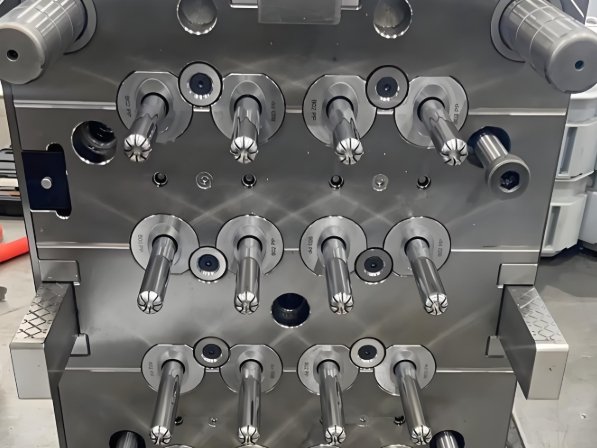
Quality control is critical in medical injection molding. AI-driven technology is improving accuracy, reducing defects, and ensuring compliance. Mold makers are using AI to enhance precision and optimize production. This article explores how AI is transforming quality control in medical molding.
Why Quality Control is Essential in Medical Injection Molding
1. Ensuring Patient Safety
Medical devices must be free from defects. AI ensures consistent quality to protect patients.
2. Meeting Regulatory Standards
FDA and ISO regulations require strict quality control. AI helps maintain compliance.
3. Reducing Waste and Costs
AI detects defects early. This reduces material waste and production costs.
4. Improving Production Efficiency
AI optimizes manufacturing processes. This leads to faster cycle times and higher output.
How AI is Transforming Medical Injection Molding Quality Control
1. AI-Powered Visual Inspection
- Uses high-resolution cameras and deep learning.
- Detects microscopic defects in molded parts.
- Eliminates human error in inspections.
2. Predictive Maintenance for Molds
- AI monitors mold wear in real-time.
- Predicts failures before they happen.
- Reduces downtime and prevents defects.
3. Real-Time Process Monitoring
- IoT sensors track temperature, pressure, and cycle time.
- AI analyzes data to detect inconsistencies.
- Ensures every part meets exact specifications.
4. Automated Dimensional Analysis
- AI-driven measurement tools scan parts for accuracy.
- Compares dimensions to design blueprints.
- Guarantees consistency in medical injection molding.
5. Machine Learning for Process Optimization
- AI learns from past production runs.
- Adjusts parameters for better efficiency.
- Reduces defects by optimizing molding conditions.
The Role of AI in Reducing Defects
1. Identifying Material Issues
- AI detects impurities in raw materials.
- Prevents contamination in medical components.
2. Detecting Surface Imperfections
- AI-powered cameras spot scratches, bubbles, and warping.
- Ensures flawless surfaces for medical use.
3. Eliminating Variability in Production
- AI standardizes production conditions.
- Ensures all parts meet the same quality standards.
4. Analyzing Reject Rates
- AI identifies patterns in rejected parts.
- Helps mold makers improve mold designs.
How Mold Makers Are Using AI for Quality Control
1. Designing AI-Optimized Molds
- AI suggests the best mold geometry.
- Ensures even material distribution.
2. Implementing Smart Mold Sensors
- Sensors track pressure and temperature inside molds.
- AI analyzes data to detect mold defects early.
3. Automating Mold Maintenance
- AI schedules maintenance based on performance data.
- Extends mold life and prevents unexpected failures.
4. Enhancing Cooling System Efficiency
- AI designs conformal cooling channels.
- Reduces cycle time and improves mold performance.
Challenges in Implementing AI for Quality Control
1. High Initial Investment
- AI systems require advanced software and hardware.
- Long-term benefits outweigh the initial cost.
2. Data Security Concerns
- AI relies on cloud-based data storage.
- Cybersecurity measures are needed to protect sensitive data.
3. Integration with Existing Systems
- Older machines may not support AI upgrades.
- Requires investment in IoT-enabled equipment.
4. Need for Skilled AI Operators
- Employees need training to manage AI-driven systems.
- AI expertise is becoming essential in medical injection molding.
Latest AI Innovations in Medical Injection Molding Quality Control
1. AI-Powered Defect Prediction
- Uses deep learning to predict potential defects.
- Adjusts molding conditions to prevent errors.
2. Robotic AI-Driven Quality Inspection
- Automated robots perform high-speed inspections.
- Increases accuracy and reduces human workload.
3. Blockchain for AI-Tracked Compliance
- AI records quality data on blockchain.
- Ensures transparency in regulatory audits.
4. AI-Based Adaptive Molding
- Molding machines adjust settings in real-time.
- AI ensures consistent production quality.
5. Cloud-Based AI Monitoring Systems
- AI collects and analyzes data remotely.
- Helps manufacturers monitor multiple production sites.
Future Trends in AI for Medical Injection Molding
1. Fully Autonomous Quality Control
- AI will take over the entire inspection process.
- No human intervention will be needed.
2. AI-Generated Digital Twins
- Virtual models of production lines will predict defects.
- Manufacturers can test improvements before applying changes.
3. AI-Powered Smart Factories
- Entire medical injection molding plants will be AI-driven.
- Self-learning systems will optimize efficiency.
4. Personalized AI Molding Solutions
- AI will create customized molding conditions for unique medical devices.
- Patient-specific implants will be produced with AI precision.
5. AI-Enhanced Sustainable Manufacturing
- AI will reduce waste and energy consumption.
- Supports greener medical production methods.
AI is transforming medical injection molding quality control. Mold makers are using smart technology to detect defects, optimize processes, and ensure compliance. With AI-driven inspections, predictive maintenance, and automated monitoring, the industry is moving toward a future of flawless medical device production.
